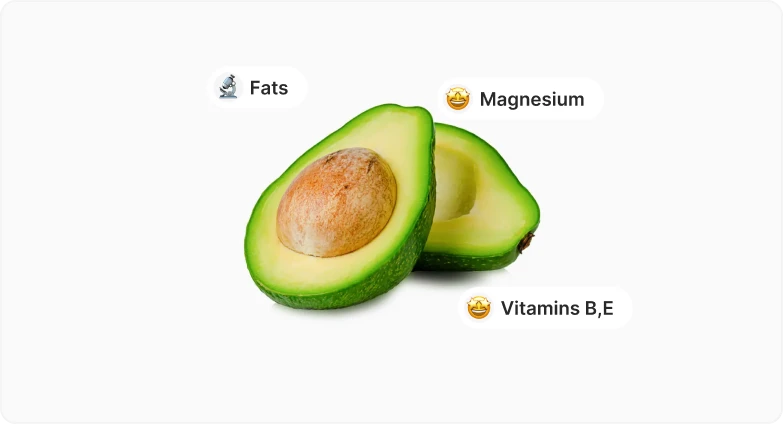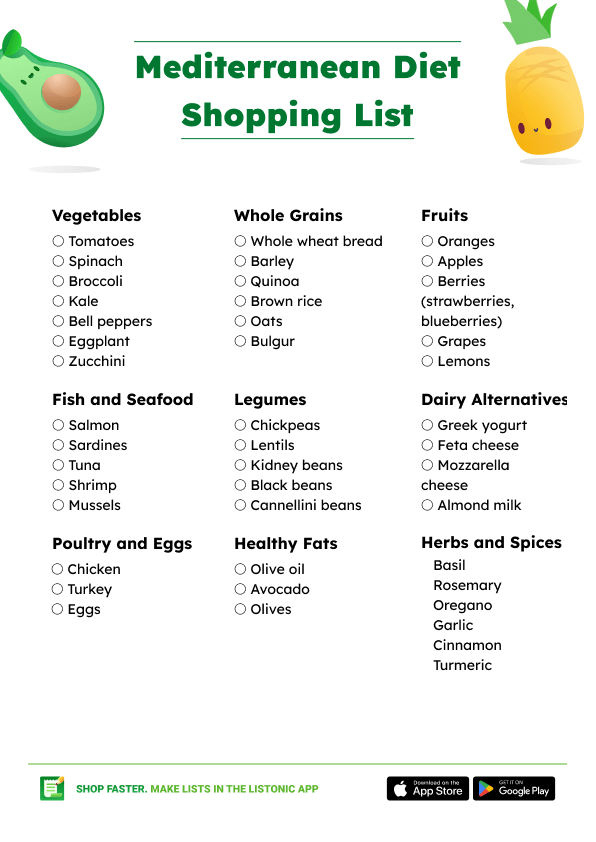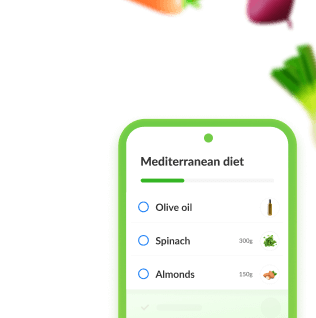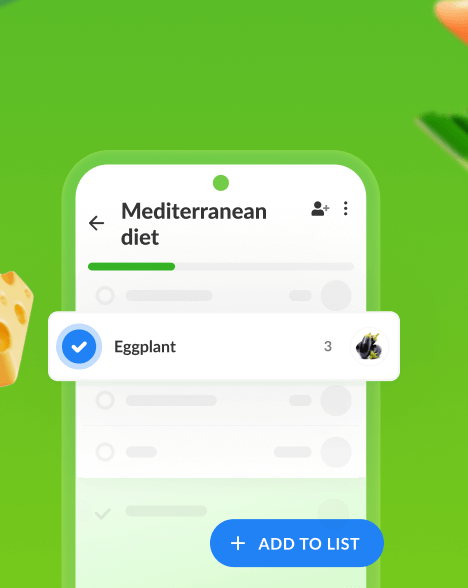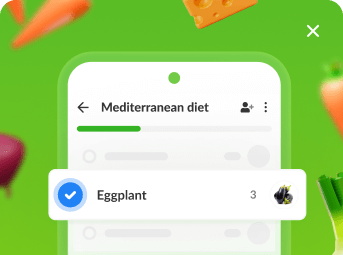Privacy Policy | Terms of services | Consent choices | © 2006-2024 Listonic. All rights reserved. Listonic Dev, and Listonic Ads are part of Listonic.
Mediterranean Diet Food List (+ Shopping List and PDF)
June 26, 2023
Meet the Mediterranean diet, which combines health benefits with wonderful flavors. Below you’ll find out its key components, health benefits, and a convenient shopping list. From nutrient-dense fruit and vegetables to heart-healthy olive oil and omega-3-rich seafood, our list ensures you have all the necessary ingredients for this transformative culinary journey. Let’s get into it.
Table of contents
Mediterranean Diet Shopping List
Basic Guidelines for a Mediterranean Diet
Food List Breakdown
What Else to Keep in Mind?
Conclusions
Mediterranean Diet Food List
Fruit
Vegetables
Whole Grains
Legumes
Nuts and Seeds
Healthy Fat
Fish and Seafood
Poultry and Eggs
Dairy and Dairy Alternatives
Herbs and Spices
Basic Guidelines for a Mediterranean Diet
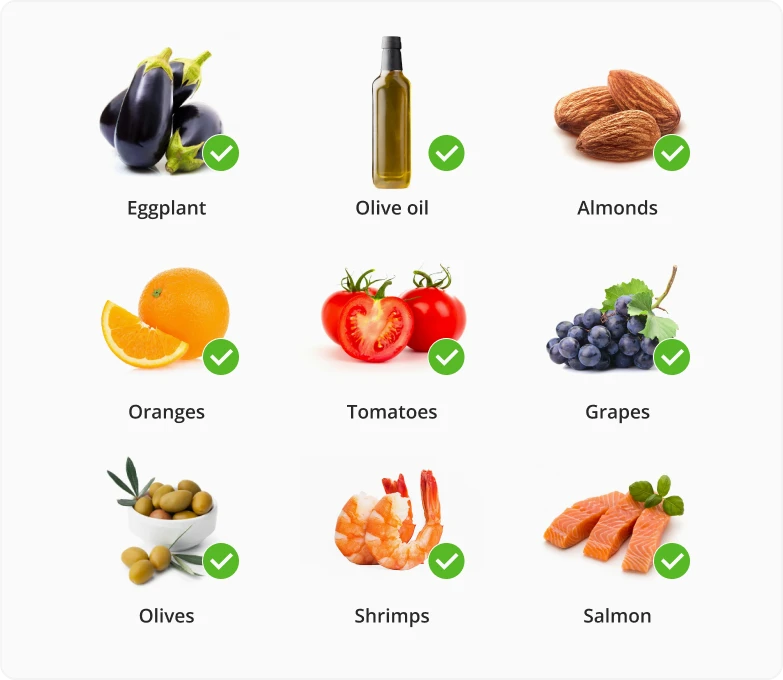
This dietary plan is said to have numerous health benefits within cardiovascular function, reducing stroke rates, cancer prevention, and more. The Mediterranean style encourages balance by consuming varied but nutrient-dense meals while minimising high-sugar processed foods. Above all, the Mediterranean Diet isn’t just any meal intake method otherwise, a manageable, lifestyle choice.
Following a Mediterranean-style diet involves consuming food inspired by the traditional cuisine around the beautiful Mediterranean Sea. It comprises food options that haven’t undergone processing or refining like fruit, vibrant green veggies, beans, whole grains, oatmeal, corn, compared to unhealthy fat devoid of nutrients. Poultry and fish can be included in moderation. Nuts, herbs, are encouraged for additional flavor without compromising on nutrition
Food List Breakdown
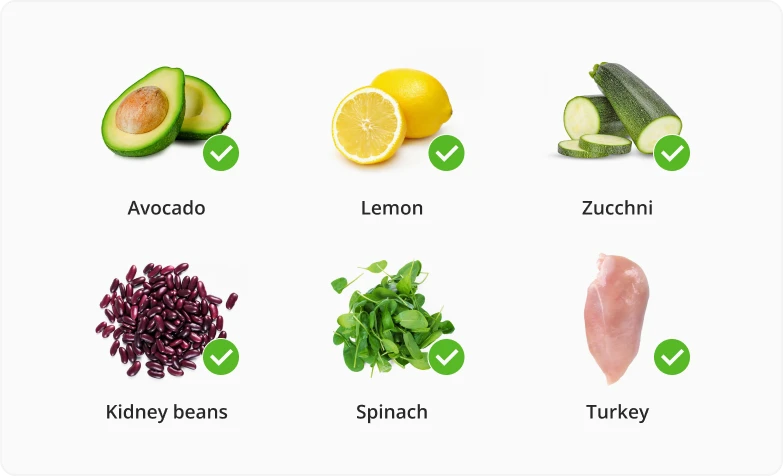
Fruit
Eating fruit is an integral aspect of a Mediterranean diet because it reflects its culinary heritage rooted in consuming natural, unprocessed food items available locally. The vast availability and diversity make it easy for people living in this region to include them regularly in their meals along with other nutrient dense foods like vegetables and lean meats.
Besides, eating fruit like oranges, grapes or apples could make a significant contribution to promoting health and wellbeing.
Vegetables
In the Mediterranean diet, vegetables hold a central role. They are crucial in maintaining the overall balance of this eating pattern. Reflecting the emphasis on plant-based foods that characterize the Mediterranean way of eating, vegetables contribute essential vitamins, minerals, and fiber to the diet. Their robust flavors and textures charm palates everywhere, simultaneously promoting wellness.
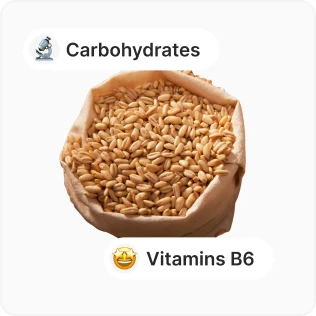
Whole Grains
For centuries, whole grains have been a dietary staple in Mediterranean countries. The Mediterranean way of eating places special emphasis on incorporating beneficial grain varieties into one’s dietary regimen for sustained energy support, significant nutritional intake, as well as satiety promotion.
Whole grain options such as oats, whole wheat flour or bread dominate this dietary plan to promote intake of complex carbohydrates-essential for overall health success. Adding these grain choices enriches traditional Mediterranean cuisine by conferring different textures and nutty flavors.
Healthy Fat
Another food category that’s vital for optimal nutrition is healthy fat. Think of olive oil, for example, a benchmark of a healthy eating plan. By including such good-for-you oil in meals, you not only honor longstanding culinary traditions but also reap valuable rewards such as better heart health and improved overall wellness.
Nuts and Seeds
Nuts and seeds have been treasured in the Mediterranean region for centuries due to their delicious taste, unique textures, and numerous health benefits. These small but mighty ingredients are rich in healthy fats, protein, and essential nutrients, making them a perfect fit for the Mediterranean diet’s emphasis on incorporating nutrient-dense foods that promote heart health and overall well-being.
Legumes
Legumes have remained a cherished component of Mediterranean food culture. These nutrient-rich powerhouses are both cost-effective and highly beneficial sources for protein and fiber intake. Adding chickpeas, lentils, and kidney beans to one’s meal plans results in nutritious diets that promote sustainability practices.
Fish and Seafood
The centrality given to consuming fish and seafood in traditional Mediterranean diets owes largely to its vast coastal areas’ ecological blessings. This geographical advantage has allowed for developing significant reliance on these nutritious food offerings while shaping the regional culinary culture distinctively.
Seafood can contribute immensely towards dietary goals like providing essential amino acids like omega-3 fat linked majorly with heart health. Most importantly, these foods’ nutrient composition is well-matched to the Mediterranean lifestyle’s focus on healthy eating principles that promote longevity.
Poultry and Eggs
Incorporating poultry and eggs in moderation is part of keeping up with the Mediterranean diet’s flexible approach to food choices, rather than only focusing on seafood and plant-based items.
They offer additional options for protein and add versatility to meals. Grilled chicken breasts or roasted turkey pieces can be an excellent way to add some change to your menu while maintaining high nutrition values; likewise, egg dishes like omelettes can also be diverse yet equally nourishing options.
Dairy and Dairy Alternatives
You should consume dairy products in moderation and primarily in the form of yogurt and cheese. Although they’re not advisable in large amounts, they can provide you with valuable nutrients such as protein, calcium, and probiotics.
Keep in mind that you can also go for diary alternatives (e.g. almond milk) to meet your dietary restrictions and individual tastes or preferences.
Herbs and Spices
The Mediterranean diet emphasizes natural flavors and culinary creativity, and herbs and spices perfectly embody these principles. They play a crucial role in enhancing the taste of foods while reducing your reliance on salt. Plus, they reflect the rich culinary heritage of the Mediterranean region and contribute to the overall enjoyment of meals.
Get a Mediterranean Diet Grocery List on Your Phone!
Add & remove items
Sort items by store aisles
Share the list with your partner
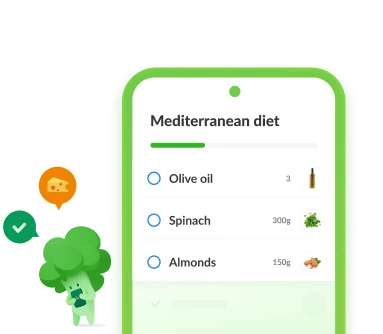

What Else to Keep in Mind?
What Foods to Avoid?
While the Mediterranean diet focuses on wholesome and natural foods, there are some items that are generally limited or avoided. These include:
Sausages, bacon and deli meats - they often contain substantial levels of unhealthy fat, sodium and preservatives. You should limit the consumption of these highly processed foods by all costs.
Added sugars - they can be found in certain food items like sugary beverages, sweets and pastries, and they can adversely affect our well-being. Limit their intake or avoid consuming them altogether if possible.
Saturated fats - the diet promotes healthy kinds of oil like olive oil; however, being cautious with sources full of unhealthy saturated fat such as butter or high-fat dairy products or fatty meats is necessary. To substitute these items, try choosing food items containing beneficial plant-based fat such as avocados or nuts.
Fast foods and processed products - they may contain high levels of trans fat, added sugars and an excess of sodium (all posing significant risks to your health). With low nutrient value often being a common trait, these food types have a tendency to lead towards unhealthy conditions including weight gain.
Mediterranean Diet Breakfast Ideas
Integrating elements from the Mediterranean diet into your early morning nourishment routine sets up an advantageous pattern for optimal health throughout your day.
Greek yogurt: Treat yourself to an energizing breakfast with a bowl of refreshing Greek yogurt parfait. Make it more appetizing by harmoniously placing vibrant berries and creamy yoghurt along with crunchy granola or nuts on top.
Avocado Toast: For those seeking out uncomplicated but satisfying breakfast options, consider whipping up some tasty avocado toast. Begin by using fresh slices from your favorite whole-grain bread, spread rich and creamy mashed avocados all across it, and incorporate sweet cherry tomatoes or feta cheese bits scattered throughout.
Vegetable Omelette: Grill up vibrant veggies such as bell pepper rings, hints of baby spinach, onion pearls and tomato slices, and mix them with two eggs.
Mediterranean Frittata: This protein-packed dish consists of eggs blended with diced zucchini chunks along with cherry tomatoes, sliced olives as well as crumbled feta cheese bits which are all baked together.
Whole Grain Porridge: Prepare a warm and comforting bowl of whole grain porridge using oats, quinoa, or bulgur. Cook it with milk or water, and add flavors like cinnamon, vanilla extract, and a handful of chopped nuts or dried fruit. Top with fresh berries or Greek yogurt for added creaminess.
Conclusions
Incorporating the Mediterranean diet into your lifestyle can have a profound impact on your health and well-being. With its emphasis on whole, unprocessed foods, abundant fruit and vegetables, lean proteins, healthy fat, and limited refined sugars, this dietary pattern offers a delicious and sustainable approach to eating. To help you get started on your Mediterranean diet journey, we have provided a comprehensive shopping list that includes a variety of nutritious and delicious ingredients. Enjoy!
